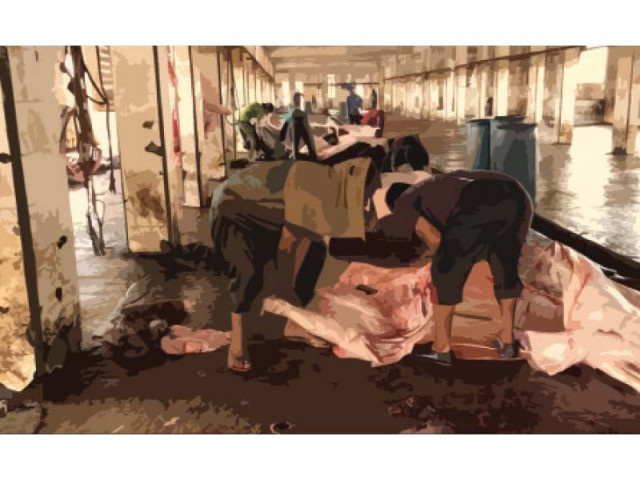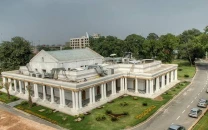Private slaughterhouses become breeding ground for disease
Butchers in twin cities allegedly slaughter sick and dead animals to make a handsome profit

Infested with flies and reeking of dung, the twin cities’ privately owned slaughterhouses are a breeding ground for diseases and with checks and balances missing, they continue to operate unhindered.
Lack of hygiene is only one side of the coin in several slaughterhouses in the federal capital and Rawalpindi as some butchers, looking to make a tidy profit, slaughter sick and sometimes dead animals as well. Butchers are obliged to sell hygienic meat certified by doctors in government slaughterhouses but there is little regard for the law when money can be minted from unsuspecting customers.
One such unsuspecting customer, Zain-ul-Abidin, a resident of Rawalpindi, was left baffled when he reached home to find that his meat purchase reeked. “Straight away I could tell that I had just been duped into buying the meat of a sick animal,” Zain-ul-Abidin complained, “when I went back the butcher told me that this was the best beef and refused to take it back.”
The cities’ butchers’ bag of tricks seems to be never-ending, however, as Murad Raja, a resident of Islamabad, was deceived by watery meat. Raja, who has a habit of weighing the meat he buys, was shocked to find that it weighed less at home than what it had weighed at the shop.
“I had just paid Rs 700 per kilogram for this beef and obviously it weighed much less since the water had dried up,” an irate Raja recounted.
When asked why butchers avoid government slaughterhouses, Nasir Khan, who owns a meat shop in Rawalpindi, said that it was more profitable to slaughter the animals themselves. “For instance, I sell 5 to 7 goats’ meat daily and if we slaughter the goat ourselves, we sell the meat as well as the legs, skins, fats, and bones separately so we make more money,” Khan explained.
Another butcher, Asghar Ali, concurring with Khan’s assessment, told the Express Tribune that poor quality meat came from other districts not the twin cities.
“Butchers in other districts slaughter animals in poor health and then freeze the meat and send it to the twin cities to make a tidy profit. We slaughter animals in our own slaughterhouses therefore the quality of meat is great,” Ali informed, further denying accusations of selling unhygienic meat.
The solution as per Tariq Butt, caretaker of Sihala slaughterhouse, which is one of the biggest in the twin cities, is to butcher animals at government approved places like Sihala as stringent checks and balances exist here.
“The animals are inspected regularly here and the place is thoroughly cleaned. Doctors and other authorities also conduct spot checks to ensure hygiene. To date, no complaint has been lodged against us,” he said.
Read: Lumpy skin disease vaccine to be imported
While butchers deny accusations and the only solution offered by authorities is to use government slaughterhouses; the problems with consuming meat unfit for humans are ten-fold.
Dr Abid Hussain, Executive Director of Polyclinic, while talking to The Express Tribune said that eating the flesh of a lean, sick animal is hazardous. “Any disease in this animal can be transmitted to humans and stomach and intestinal diseases may develop,” Hussain told The Express Tribune.
Published in The Express Tribune, March 25th, 2022.



















COMMENTS
Comments are moderated and generally will be posted if they are on-topic and not abusive.
For more information, please see our Comments FAQ